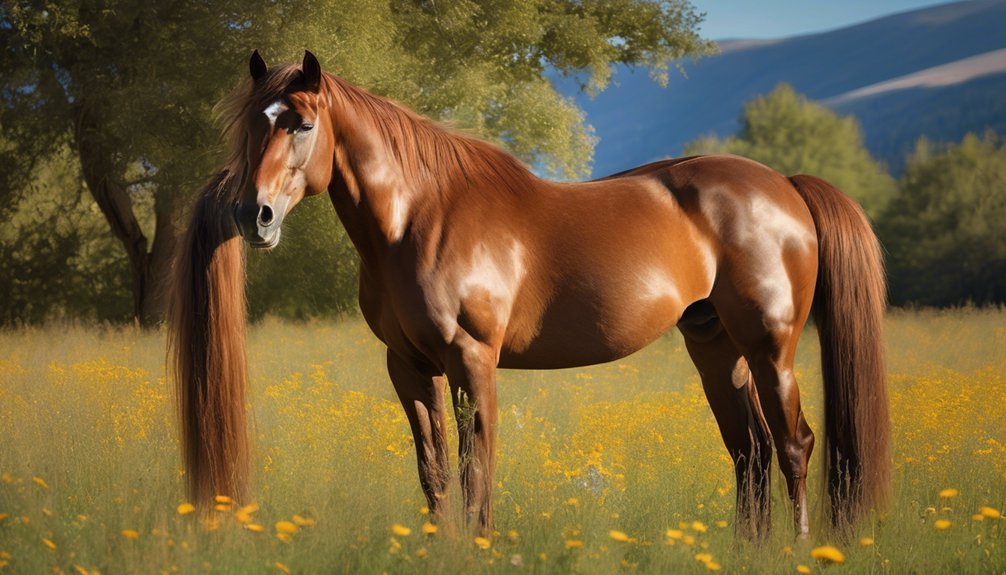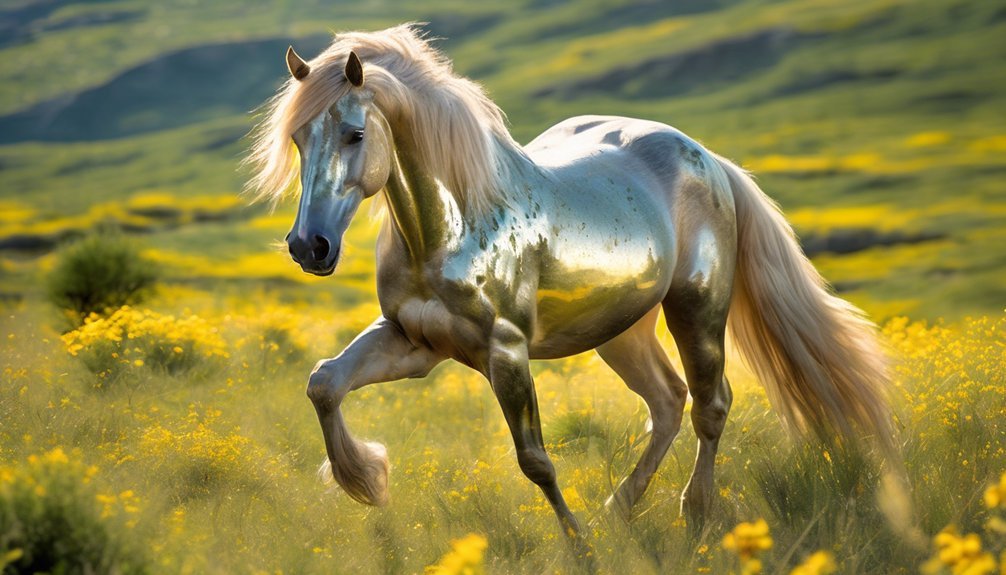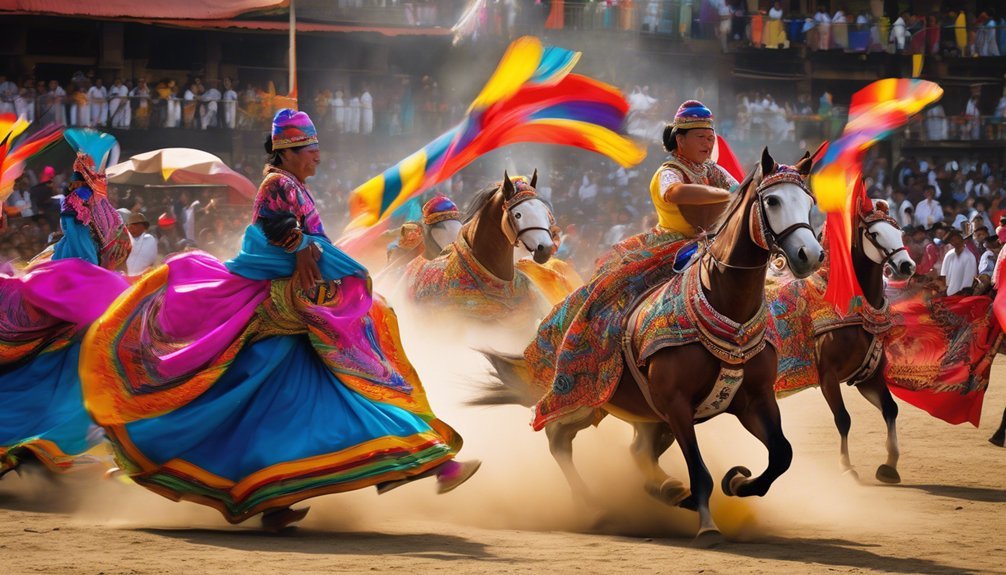
When you explore the significance of the horse in Native American culture, you uncover a profound connection that goes beyond utility. These majestic animals, reintroduced in the 16th century, reshaped social dynamics and spiritual practices across tribes. Their roles in hunting and mobility illustrate a transformative journey, while their symbolism reflects ideals of strength and freedom. Yet, what lies beneath this bond reveals deeper layers of identity and tradition waiting to be uncovered.
Key Takeaways
- Horses were reintroduced to the Americas by Spanish explorers, significantly transforming Native American cultures and social structures.
- They enhanced hunting practices and mobility, fostering deeper connections to the land and survival strategies.
- Horses hold spiritual significance, symbolizing power, freedom, and serving as guides in spiritual journeys.
- Their presence elevated social status within tribes and facilitated diplomatic relationships through horse diplomacy.
- The enduring bond between Native Americans and horses is celebrated in art and traditional practices, reflecting their historical importance.
The Historical Introduction of Horses to Native American Tribes

When Spanish explorers reintroduced horses to the Americas in the 16th century, they unknowingly transformed Native American cultures forever.
These horse introductions ignited profound changes in tribal lifestyles, as communities began to adapt to this new companion. Imagine the thrill of a young warrior, feeling empowered on horseback, able to traverse vast landscapes with ease.
As tribes integrated horses into their daily lives, they redefined their social structures, trade, and even spiritual practices. The horse became more than just a mode of transport; it was a symbol of status, strength, and connection to the land.
You can sense the deep bond formed between the tribes and these majestic creatures, as they navigated a world ripe for transformation and adaptation.
Transformative Impact on Hunting and Mobility
The introduction of horses revolutionized hunting practices for Native American tribes, enabling them to pursue game with unprecedented efficiency and agility. With mobility enhancement, tribes adapted their hunting techniques, covering vast distances and tracking animals more effectively. Imagine the thrill of riding alongside your kin, the wind in your hair, as you chase after buffalo across open plains.
| Hunting Techniques | Mobility Enhancement |
|---|---|
| Mounted archery | Faster travel to hunting grounds |
| Herding strategies | Strategic positioning |
| Coordinated group hunts | Pursuit over varied terrain |
This newfound freedom transformed not just how you hunted but how you lived, fostering a deeper connection to the land and the creatures within it. The bond with the horse became essential for survival and culture.
Horses in Native American Spirituality
While horses transformed daily life for Native American tribes, they also held profound spiritual significance, embodying power, freedom, and connection to the divine.
You'll find that horses often serve as vital animal guides during spiritual journeys, leading individuals toward deeper understanding and enlightenment. Many tribes believed that the horse could bridge the earthly and spiritual realms, offering wisdom and protection.
The horse's graceful movements symbolize the flow of life, encouraging you to embrace change and navigate your own path with courage. In rituals, the presence of horses amplifies the energy of prayer, reinforcing the bond between the physical and spiritual worlds.
This sacred relationship highlights not just the horse's role in survival, but its essence as a spiritual companion on your journey.
Symbolism of Strength and Freedom

Although many cultures recognize the horse as a symbol of strength and freedom, in Native American traditions, this symbolism takes on a deeper, more nuanced meaning. The horse represents not just physical power but also the spirit of liberation and the quest for identity. You'll find that the bond between horse and rider transcends mere utility; it embodies a sacred connection to the land and community.
| Strength Symbolism | Freedom Representation |
|---|---|
| Power in adversity | The spirit of exploration |
| Resilience through challenges | Liberation from constraints |
| Connection to ancestors | Journey toward self-discovery |
| Unity with nature | Expression of cultural pride |
In this way, the horse becomes a vital emblem of both personal and communal freedom.
The Role of Horses in Tribal Social Structures
Horses play a pivotal role in the social structures of Native American tribes, influencing everything from status to community dynamics. They aren't just transportation; they're symbols of power and prestige.
In many communities, possessing horses elevates one's standing, shaping relationships and hierarchies. You might find that equestrian leadership emerges during gatherings, where skilled riders demonstrate their abilities, fostering respect and admiration.
Horse diplomacy further enhances social bonds, facilitating negotiations between tribes. When tribes come together, the exchange of horses often signifies trust and alliance.
Thus, horses weave a rich tapestry of connection and collaboration in tribal life, where every gallop and neigh echoes the deep ties of kinship and shared destiny within the community.
Ceremonial Significance of Horses
In many Native American cultures, the presence of horses during ceremonies transforms these events into profound expressions of spirituality and community identity. Horses carry deep symbolic meaning, representing strength, freedom, and the connection between the physical and spiritual worlds.
During ceremonial rituals, you'll witness horse dances that celebrate their significance, where dancers embody the spirit of these majestic animals. Each movement tells a story, weaving together the past and present in a vibrant tapestry of culture.
As you participate, you feel the heartbeat of the community, understanding that horses aren't merely participants but sacred beings that enhance the spiritual energy of the gathering. This bond deepens your appreciation for the rich traditions that honor both the horse and the people.
Contemporary Celebrations of the Horse in Indigenous Communities

As communities continue to celebrate their heritage, the horse remains a central figure in contemporary Indigenous gatherings.
You'll find horseback riding woven into festivals, where the rhythm of hooves echoes the past. Equestrian events showcase not just skill, but a deep bond between rider and horse, reflecting traditions passed down through generations.
These gatherings invite you to witness vibrant displays of culture, as participants don traditional attire, celebrating the horse's role in storytelling and identity.
You'll feel the energy of the crowd, united in admiration for these majestic creatures. In every gallop and every cheer, the spirit of the horse thrives, reminding us all of its enduring significance in Indigenous life, fostering community and connection.
The Ongoing Legacy of Horses in Native American Culture
As you explore the ongoing legacy of horses in Native American culture, you'll find their spiritual significance woven into many traditions and practices.
These majestic animals serve not only as companions but also as symbols of power and connection to the divine.
Through ceremonies and storytelling, Indigenous communities continue to honor the horse's role in shaping their identities and cultural heritage.
Spiritual Significance of Horses
Although many cultures revere animals for their roles in daily life, the spiritual significance of horses in Native American culture transcends mere utility, weaving deeply into the fabric of their beliefs and practices.
Horses are viewed as guides on spiritual journeys, embodying a connection to the earth and the cosmos. They carry not just physical burdens but also the weight of emotions and ancestral wisdom. This bond is often referred to as "horse medicine," symbolizing healing and transformation.
When you ride or interact with a horse, you engage in a sacred dialogue, inviting the spirit of the horse to illuminate your path.
The legacy of horses in Native American culture is a profound testament to the intertwining of spirit and nature, inviting you to explore your own connection.
Cultural Practices and Traditions
The spiritual connection between horses and Native Americans extends into vibrant cultural practices and traditions that celebrate their ongoing legacy.
You'll find that equestrian rituals, deeply rooted in community, honor the bond between humans and horses. Horse training isn't just about skills; it's a way to connect, to understand, and to respect these majestic beings.
During ceremonies, you might witness storytelling, music, and dance that pay tribute to the horse's strength and spirit. Each movement reflects a shared history, reminding you of the importance of these animals in daily life and spirituality.
As you engage with these traditions, you'll feel the enduring presence of horses, woven into the very fabric of Native American culture and identity.
Frequently Asked Questions
How Did Horses Affect Native American Trade Practices?
Horses transformed your trade practices, enhancing mobility and expanding networks. They facilitated cultural exchange, allowing tribes to share goods and ideas more efficiently. This interconnectedness deepened relationships, enriching your community through diverse interactions and shared resources.
What Breeds of Horses Are Significant in Native American Culture?
Imagine a wild Mustang, galloping free, embodying spirit and resilience. Appaloosas, with their distinctive spots, symbolize beauty and endurance. Both breeds hold deep significance in Native American culture, representing strength, heritage, and a connection to the land.
How Are Horses Cared for in Indigenous Communities Today?
In indigenous communities today, you'll find horse care intertwined with community rituals. You nurture their well-being through careful grooming, shared knowledge, and bonding experiences, reinforcing connections among people and their horses, celebrating mutual respect and harmony.
What Role Do Horses Play in Modern Native American Identity?
Horses embody cultural symbolism for you, reflecting modern Native American identity. They're not just animals; they're expressions of heritage, resilience, and connection, weaving together past and present as you honor traditions and embrace your unique identity.
How Do Different Tribes Celebrate Horses Uniquely?
In the spirit of ancient traditions, you'll find tribes celebrating horses through vibrant horse ceremonies and lively tribal festivals. Each tribe's unique customs reflect their history, deepening your connection to these majestic creatures and their significance.
Conclusion
In Native American culture, the horse isn't just an animal; it's a living embodiment of strength and freedom. This sacred bond, forged centuries ago, continues to resonate today, shaping identities and communities. As you witness modern celebrations, like powwows where horses gallop alongside dancers, you can feel the spirit of resilience echoing through time. Each hoofbeat tells a story, reminding us that this connection is as vital as Wi-Fi in our digital age—essential for navigating life's journey.





